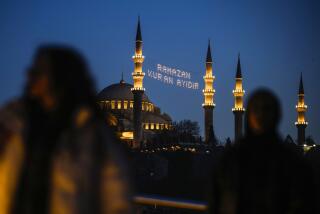Spreading Islam With His Scalpel
- Share via
ISTANBUL, Turkey — His voice quavering with emotion, his eyes blazing with missionary zeal, Kemal Ozkan, Turkey’s self-proclaimed “Sultan of Circumcision,” recalls the day in early October when he carried his art to the former Soviet republic of Kazakhstan.
“We made real Muslims of 150 boys that day,” he says. “I served Turkey. I served Islam.”
Ozkan, 68, is Turkey’s best-known paramedic specializing in the Islamic tradition of circumcision. Since launching his now-booming practice 38 years ago, Ozkan says he has circumcised more than 106,000 boys in keeping with one of the most strictly observed rites in this officially secular but predominantly Muslim nation of 63 million.
Sunnet, the Turkish word for circumcision, is seen as every Muslim male’s first step toward manhood. Turkish doctors insist that the operation, which usually takes place when a boy is between 8 and 12, is crucial to hygiene and helps prevent cancer of the prostate. Critics charge that it is psychologically debilitating when performed on grown boys and should be done immediately after birth.
During a recent interview at his sprawling “Circumcision Palace” in Istanbul’s upscale Levent neighborhood, Ozkan said his “last remaining duty” in life is to help cement the Islamic faith throughout the Central Asian and Balkan states, where decades of Communist rule left millions of Muslims unable to freely practice their religion until the period surrounding the collapse of the Soviet Union in 1991.
Ozkan believes his blade can serve as a useful tool for his country’s regional ambitions. Since the end of the Cold War, Turkey has been aggressively seeking to expand its political and economic influence in Central Asia, using its ethnic, cultural and linguistic links with the nations in the region to buttress its campaign.
The rigidly pro-Western and secular Turkish democracy has been touted by successive U.S. administrations as a role model for these countries in the face of bids for influence by fundamentalist regimes in Iran and Afghanistan. Faced with the mounting threat of Islamist insurgencies, the former Communist dictators ruling these countries have largely embraced Turkey’s efforts.
Ozkan’s first chance to fulfill his dream came during the October dedication of a university financed by the Turkish government in the southern Kazakh city of Shymkent. The paramedic and his son Murat, who has been assisting his father since the age of 8, were flown in for the occasion along with Turkish folk dance troupes and assorted ambassadors of Turkish culture.
“Three thousand Kazakhs came to watch us do our job,” Ozkan says. “Some of them cried for joy.”
In January, the Turkish government received official requests from Romania, Bulgaria and Mongolia to send in paramedics to perform mass circumcisions at the end of the academic year in June. Such ceremonies are common in rural Turkey, where poor families can have their sons circumcised by government paramedics without charge. Politicians also frequently stage mass circumcision rallies during election campaigns, and many see Ozkan as a sure vote-getter.
“There are 500 boys in Mongolia, and 300 each in Bulgaria and Romania, awaiting our services,” says Yusuf Kalkan, who is in charge of external relations at the Religious Affairs Directorate in the Turkish capital, Ankara. “It’s the first time we ever received such requests directly from governments, and frankly, we are delighted to oblige.”
Established by modern Turkey’s founder, Kemal Ataturk, in 1924 after he abolished the Ottoman sultanate and the ruling Islamic hierarchy as part of his secularizing revolution, the Religious Affairs Directorate monitors all aspects of Islamic life in Turkey. It is also one of the country’s wealthiest government agencies. And Kalkan acknowledges that many of its resources in recent years have been devoted to promoting Turkey’s moderate brand of Islam in the former Ottoman dominions in the Balkans as well as in Central Asia and the Caucasus.
Since 1990, the directorate has financed--with generous contributions from Turkish companies--the construction of 28 mosques in these regions, including four in Kazakhstan, six in Russia and two in Romania. It has also forked over millions of additional dollars to restore more than 20 mosques, such as the Koski Mehmet Pasha mosque in Mostar, Bosnia-Herzegovina, which was destroyed by shelling.
Hundreds of students train every year to become Islamic clerics at 14 theological schools set up by the directorate as far afield as Kyrgyzstan and as close to home as neighboring Bulgaria. About 3 million copies of various publications, including translations of the Koran into local languages, have been dispatched to help such scholars perfect their knowledge of Islam.
Kalkan says he may consider Ozkan’s offer to join a team of doctors who will be sent on the directorate’s overseas circumcision mission next month, the directorate’s first. His main worry for now, however, is organizing the purchase of the traditional white satin uniforms and plumed pillbox hats worn by the boys during the rite, as well as toys and candy to distract them from what is usually a painful if blissfully brief operation.
“Allah willing, we will have them ready,” he said. “Our revered prophet and Ataturk would be proud.”
More to Read
Sign up for Essential California
The most important California stories and recommendations in your inbox every morning.
You may occasionally receive promotional content from the Los Angeles Times.













